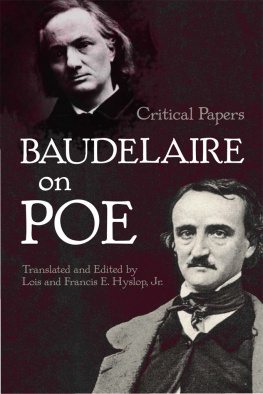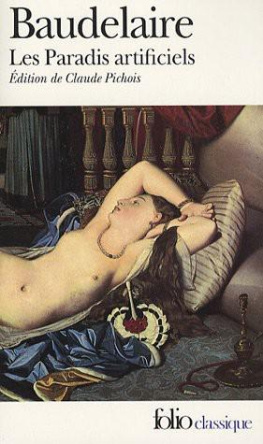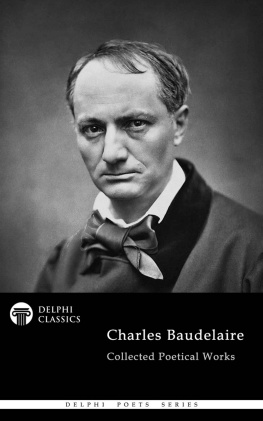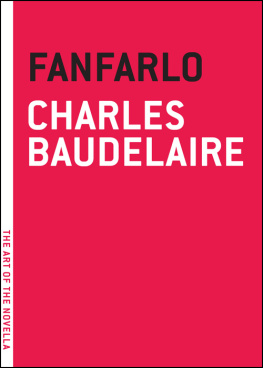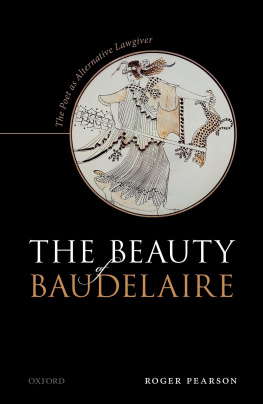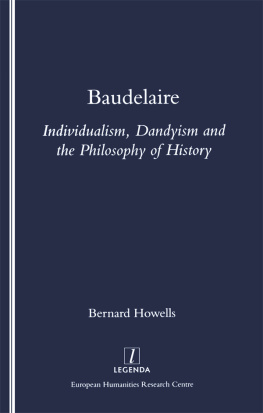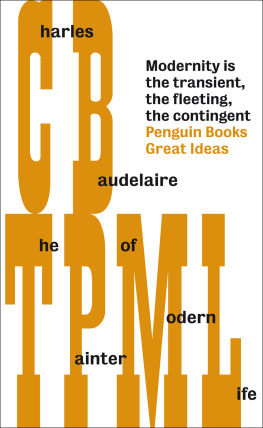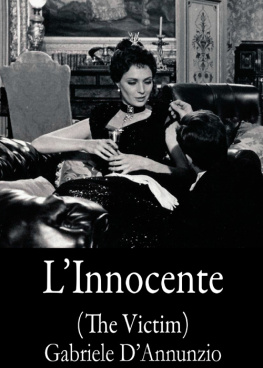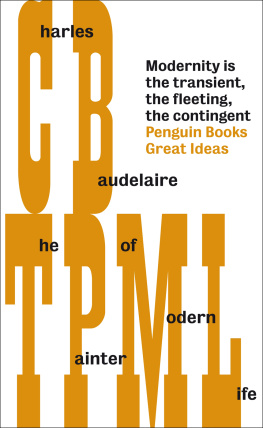credits
WRITINGS ON HASHISH AND ALCOHOL
BY CHARLES BAUDELAIRE
AN EBOOK
ISBN 978-1-908694-90-4
PUBLISHED BY ELEKTRON EBOOKS
COPYRIGHT 2013 ELEKTRON EBOOKS
www.elektron-ebooks.com
No part of this publication may be reproduced, stored in a database or retrieval system, posted on any internet site, or transmitted, in any form, or by any means, electronic, mechanical, photocopying, recording or otherwise, without the prior permission of the copyright holders. Any such copyright infringement of this publication may result in civil prosecution
ON WINE AND HASHISH
I : WINE
A very famous man, who was at the same time a great fool (things which, it would seem, go very well together, as I will undoubtedly more than once have the dubious pleasure of showing), had the effrontery to enter the following under the heading Wine in a book on Foods, written from the double point of view of Health and Taste: Noah the Patriarch is considered to be the inventor of wine; it is an alcoholic beverage made of the fruit of the vine.
And then? Then, nothing: that is all. In vain you will leaf through the volume, turning it about in all directions, reading it backwards, inside out, from right to left and from left to right; you will find nothing more about wine in La Physiologie du Gout by the most illustrious, most highly respected Brillat-Savarin. Noah the Patriarch... and it is an alcoholic beverage...
I am picturing a moon man, or an inhabitant of some distant planet, travelling in our world; tired with his long trek, he seeks to cool his palate and warm his stomach. He is eager to acquaint himself with the delights and customs of our land.
He has heard sketchy accounts of delicious beverages with which the citizens of this planet can at will secure courage and cheerfulness for themselves. So that he may be more sure of his choice, the moon man turns to that oracle of taste, the celebrated and infallible Brillat-Savarin, and there, under the heading Wine, he finds this gem of information: Noah the Patriarch... and it is an alcoholic beverage... That is quite a digestive. That is most explanatory. It is impossible, after reading that sentence, not to have a clear and precise idea of all the wines, of their different qualities, their drawbacks, their power over mind and stomach.
Ah! dear friends, dont read Brillat-Savarin. God protects the ones He loves from worthless reading; that is the first maxim in a little book by Lavater, a philosopher who loved mankind more than did all the magistrates of the Ancient and Modern Worlds. No cake has been named in Lavaters honor; but the memory of this angelic man will live on among Christians when even the worthy bourgeois have forgotten the Brillat-Savarin, that tasteless variety of roll, the least of whose defects is that it serves as a pretext for a twittering of foolishly pedantic maxims drawn from the famous chef-doeuvre.
You melancholy drinkers, you merry drinkers, you forgotten and ignored drinkers, all of you who seek in wine either remembrance or forgetfulness, and who, never finding either complete enough to suit you, no longer lift your eyes to heaven except through the bottom of the bottle: if a new edition of this mock masterpiece were to risk insulting modern humanity, would you buy a copy, and return good for evil, kindness for indifference?
I open the divine Hoffmanns Kreisleriana, and there I read a curious recommendation. The conscientious musician should avail himself of champagne to compose a comic opera. In it he will find the light and frothy gaiety called for by the genre. Religious music requires Rhine wine or Jurancon. In these there is the same intoxicating sorrow that underlies profound thoughts. On the other hand, Burgundy is indispensable to heroic music. It has all the intense passion and ardor of patriotism. There we certainly have a better approach to the question, and beyond the impassioned sentiment of a drinking man, I find in it an impartiality that does the greatest honor to a German.
Hoff mann had set up a unique psychological barometer designed to show him the various temperatures and atmospheric conditions of his soul. On it we find such calibrations as these: Slightly ironic frame of mind, tempered by indulgence; feeling of loneliness, accompanied by profound self-content; musical merriment, musical ecstasy, musical storm; sarcastic merry-making that is unbearable even to me; desire to step out of my Self, extreme objectivity, fusion of my Self with all of Nature. Needless to say, the calibrations of Hoffmanns mental barometer were set in order of their appearance, just as is the case with ordinary barometers. I feel that an obvious kinship exists between this psychic barometer and Hoffmanns explanation of the musical qualities of wines.
At the point that death came to claim him, Hoffmann was just beginning to make money. Fortune was smiling upon him. As was the case with our beloved Balzac, it was only towards the end that he saw the realization of his earliest hopes. At that time, editors who were competing for publication of his tales in their almanacs would try to get into his good graces by including a case of French wines with the money they sent.
II
Who has not known the profound joys of wine? Everyone who has ever had remorse to appease, a memory to evoke, a grief to drown, a castle in Spain to build in short, everyone has invoked the mysterious god hidden in the fibres of the vine. How great is the spectacle of the wine, lit by an inner sun! How real and ardent is the second youth that man sips out of it. But how dreadful, too, are its crushing pleasures, its debilitating charms. And yet, if truth be told, which of you judges, you legislators, you men of the world you who are sweetened by happiness, and graced by fortune with virtue and good health which of you would have the merciless courage to condemn the confirmed drinker?
Moreover, wine is not always that terrible wrestler, sure of its victory, and sworn to have neither pity nor mercy. Wine is like man: you never know how much you can both scorn and respect it, love and hate it; nor can you tell how many sublime works or monstrous crimes it is capable of. Let us not be crueller towards it than we are towards ourselves; let us treat it as our equal.
I sometimes seem to hear the wine; it speaks with its soul, in the spirit voice heard only by spirits, and says, Man, my beloved creature, even through my prison of glass and bolts of cork, I want to send you a song filled with good-fellowship, a song of joy and light and hope. I am not ungrateful; I know that I owe my life to you. I know how much you have labored, with the hot sun on your shoulders.
You have given me life, and I will repay you. I will pay my debt liberally; for I feel an extraordinary joy when I tumble down a gullet dried by work. An honest mans chest is a dwelling far more pleasant than these cheerless and unfeeling wine-vaults. It is a joyful tomb, where I fulfill my destiny with enthusiasm. I raise a great hullabaloo in the working mans stomach; from there, I rise by invisible stairways to his brain, where I do my last great dance.
Do you hear the powerful refrains of olden days, the songs of love and glory, rumbling and resounding in me? I am the soul of the Nation, half gallantry, half military might. I am Sundays hope. Work enriches the weekdays, wine brings happiness to Sunday. Sitting with your elbows on the family table, your shirt-sleeves rolled up, you will do me proud honor; and you will feel truly content.
I will light the eyes of your old wife, the aged companion of your daily trials and life-long hopes. I will soften her look, and put the gleam of youth back in her eye. And as for your beloved little son (how pale he is, poor little donkey, yoked like a workhorse in hard labor!), I will return the beautiful color of his infancy; for this new athlete of Life I will be like the oil that strengthened the muscles of wrestlers of old.


